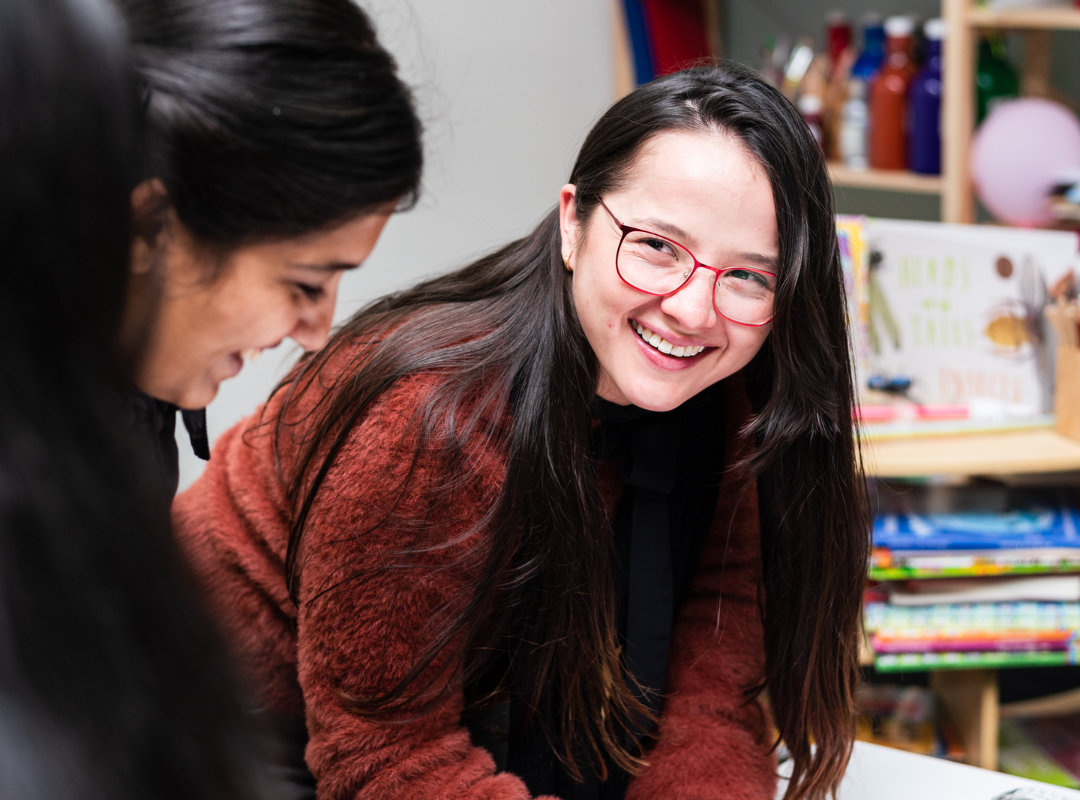Overview
The Diploma of Early Childhood Education is suitable for anyone who has a genuine interest in understanding and supporting children’s learning and development in early childhood environments. You will gain a contemporary body of knowledge and skills necessary to educate children from birth to five years in diverse settings and professional roles. You will study the significance of the learning and development that takes place from birth until the start of school.
Over two years, you will have the opportunity to develop skills in play pedagogy; safety, health and wellbeing; documentation, planning and assessment; sustainability education; working with families and communities; understanding and guiding children’s behaviour; diversity and inclusion; and curriculum approaches and teaching strategies. A key component of the course involves two placements with babies, toddlers and pre-schoolers across diverse early childhood education settings.
Through this course, you will develop relational skills and therapeutic presence to help clients explore their inner experience through the creative arts and the art-making process.
This qualification is FEE-HELP approved for eligible applicants.
Key Information
| Award | Diploma of Early Childhood Education |
| Duration | 2 Years Full Time (or Part Time Equivalent) |
| Study Mode | On Campus Online Learning* |
| Locations | Adelaide, Brisbane, Melbourne, Sydney, Online |
| Intakes | February, May, September |
| Course Fees | Domestic (FEE-HELP available) International |
*International students may study up to one-third of the subjects in a course online. Domestic students may study the full course online.
Trimester 1, 2025 Applications Close
Career Opportunities
The Diploma of Early Childhood Education prepares graduates for a rewarding career as an early childhood educator for children aged birth to five years. You will have the skills and knowledge to educate and care for children in various settings. Potential roles include:
- Early childhood educator
- Family day care educator
- Occasional care educator
- Childcare worker/nanny
- Educational leader
- Room leader
- Second in charge/certified supervisor
Professional Recognition
This course is recognised by the Australian Children’s Education and Care Quality Authority (ACECQA), qualifying graduates as Diploma Educators under the Australian National Quality Framework.

Course Structure
You must successfully complete 16 subjects, totalling 96 credit points, to complete the Diploma of Early Childhood Education. Each subject is specifically designed to provide you with the essential skills and understanding to excel in the field of early childhood education.
The course also includes 2 supervised placement subjects totalling 30 days (240 hours).
If you plan to study full time, a full-time load is typically 8 subjects per year. For part-time students, you will typically complete 5 subjects per year. Please note that our academic year is structured into three trimesters, each consisting of 11 weeks of teaching followed by an exam week.
Delivery & Workload
This course has been designed to offer a dynamic and engaging learning experience. Your study will involve a mix of lectures, tutorials, self-directed study and workplace learning. Each academic year includes one placement, allowing you to gain 30 days (or 240 hours) of professional experience by the end of your course.
For each subject, allocate about three hours for lectures and tutorials. Additionally, you should allow approximately 10 hours per week per subject for self-directed study to complete prescribed readings, practice skills, conduct research, and complete assessments at your own pace.
Subjects
Year 1
Year 2
This subject explores the day-to-day practices of an early childhood teacher including:
- The daily responsibilities of early childhood professionals.
- Operations in early childhood settings.
- Conventions, frameworks, legislation, regulations, codes of conduct, duty of care, policy, procedures, and quality assurance processes.
- Engaging in pedagogical and educational programs and practices.
- The importance of relationships, partnerships and collaboration with families, communities and children.
- The significance of rights, dignity, equity, diversity, cultural competence and inclusion in early childhood.
- Respecting and including Aboriginal and Torres Strait Islander peoples and cultures.
Subject Code: EPRO101
Credit Points: 6
This subject covers the following components of play and documentation techniques used in early childhood education settings:
- Early childhood play theory and pedagogy.
- The early childhood teacher’s role in facilitating play.
- Engaging children in play activities.
- Understanding methods of observing and documenting children’s behaviour in early childhood settings.
- The purpose and variety of narrative methods used to document young children’s learning.
- Creating play environments and experiences for young children.
Subject Code: ECUR102
Credit Points: 6
Co-Requisite: COU102 Integrative Psychotherapy in Practice
This subject explores the following components of child development and how they are applied in early childhood teaching and curriculum.
- Genetics and growth in the first eight (8) years.
- Developmental theories, influences, and perspectives.
- Domains of child development and learning behaviours.
- Brain development, structure, and neuroscience in the early years.
- Holistic child development and its impact on pedagogical practice.
Subject Code: EDEV103
Credit Points: 6
This subject covers various aspects of supporting, facilitating, and promoting diversity, equity, cultural responsiveness, and inclusivity in early childhood contexts including:
- The significance of rights, dignity, equity, diversity, cultural responsiveness, and inclusion.
- Understanding relevant conventions, frameworks, legislation, regulations and codes of conduct.
- Linking educational frameworks and curriculum principles, capabilities, and practices.
- Exploring cultural competence in relation to cultural identity, cultural considerations and promoting awareness of diversity, equity, and inclusivity in the early years.
- Using inclusive teaching methods to educate young children about cultural diversity, prejudice, respect and belonging in early years curriculum provision.
Subject Code: EPRO104
Credit Points: 6
Pre-Requisite: EPRO101 Professional Practice
This subject explores the following aspects of supporting, facilitating, and promoting the holistic wellbeing of infants and young children in early childhood contexts.
- National regulatory considerations for wellbeing, health, safety, and nutrition.
- Providing care to infants, toddlers, and young children aged 3 to 8 years.
- Ensuring children’s safety in service environments, including protection from maltreatment (abuse and neglect) and handling emergency situations.
- Managing children’s health, including screening, immunisation, medication administration, illness management, allergies, and special medical conditions.
- Promoting children’s nutrition through understanding dietary guidelines, food concepts, and food preparation safety.
- Understanding the interconnectedness of physical, mental, social, and emotional health for children’s overall wellbeing.
- Planning for and teaching health, safety, nutrition, and wellbeing to young children across a range of diverse contexts.
Subject Code: EPRO105
Credit Points: 6
This subject explores the following components of young children’s care and learning to facilitate early childhood education and care:
- Contemporary theories, approaches, models, and frameworks for teaching, educating, and responding appropriately to young children.
- Documentation, assessment, planning, implementation, and evaluation of learning opportunities for young children across the National Quality Framework Approved Learning Frameworks and Australian Curriculum.
- Fostering young children’s learning dispositions and holistic development in young children across all areas of early childhood curriculum provision.
Subject Code: ETCH106
Credit Points: 6
Pre-Requisites: ECUR102 Exploring Play and Documentation, EDEV103 Holistic Child Development
This subject explores the following components of supporting, facilitating, and promoting young children’s creativity across integrated curriculum provision in early childhood contexts.
- Fostering creativity and aesthetics through understanding theoretical foundations; the concepts of creativity and aesthetics; and how to promote creative and aesthetic learning opportunities.
- Planning and implementing creative experiences through understanding the role of children and teachers in creative activities; designing and implementing creative environments; and the interconnectedness of play, holistic development, and creativity.
- Facilitating creativity within the curriculum through art, drama, movement, music, language and literacy, mathematics and numeracy, humanities and social sciences, technologies, engineering and science.
- Teaching creativity across integrated curriculum through STEM, STEAM, STREAM and STEMIE
Subject Code: ETCH107
Credit Points: 6
In this subject, you will explore your developing understanding of the early childhood profession and expectations within the three to five age range in an education and care setting. Throughout the professional experience component of this subject, you will apply your professional knowledge and demonstrate pedagogical skills in the following focus areas:
Subject Code: PLAC907
Credit Points: 6
Pre-Requisites: All Level 100 (Year 1) subjects
This subject explores the following components of theoretical perspectives and educational theories that influence early childhood teaching and learning:
- Recognising the theoretical influences underpinning global early childhood pedagogy and professional practice.
- Critically reflecting on and evaluating early childhood educational theoretical perspectives that influence teaching and children’s learning.
- Investigating developmental, socio-cultural, cultural-historical, socio-behaviourist, critical, post structuralism, post-modernism, and contemporary theories in relation to pedagogical implications in the teaching and learning environment.
- Identifying theories in children’s play and the domains of development and applying this in curriculum provision, the planning cycle and teaching practices.
Subject Code: EPRO201
Credit Points: 6
This subject explores the following components of young children’s and early childhood teachers understanding and supporting exceptionality to enable inclusivity in early childhood contexts:
- Contemporary inclusive education research, recommendations, strategies, and approaches to enhance and enrich the inclusion of children with exceptionalities and diverse learning needs into early childhood contexts.
- The characteristics of exceptionality that influence the inclusion of children in early childhood settings and curriculum provision.
- Recognising the barriers, limitations, modifications, and interventions children with exceptionalities require for inclusive curriculum provision and learning environments.
- Engagement with inclusive approaches, perspectives, and teaching practices to support young children with exceptionalities in early childhood settings.
Subject Code: EDEV202
Credit Points: 6
This subject explores the following components of understanding and guiding behaviour to enable the provision of early childhood education and care to young children:
- Brain architecture and how early experiences shape the developing brain and influence young children’s behaviour.
- The significance of the links and connections between young children’s contexts, holistic development, and needs on their behaviour.
- Pedagogical strategies for understanding how to guide young children’s behaviour whilst facilitating their social-emotional skills through attachment, positive relationships, and interactions.
- Teaching strategies and approaches to support young children’s behaviour and nurture positive self esteem, wellbeing, self-regulation, and emotional intelligence.
- The importance of play, curriculum provision and identifying the early childhood teachers’ role in guiding behaviour to promote every child’s agency within the learning environment.
Subject Code: ETCH203
Credit Points: 6
This subject explores the following components of working with families and communities to enable the provision of early childhood education and care:
- contemporary sociology, theories and influences of family and community contexts on young children’s development and learning.
- social policy that influences the social behaviour, relationships, interactions, culture and contexts of children, families, and communities.
- he diversity, complexity, changing nature and challenging contexts encountered by families and the impact on children’s development in contemporary society.
- contextualised research, projects, programs, resilience raising strategies and approaches to working with and supporting family and community contexts in early childhood education.
Subject Code: EPRO204
Credit Points: 6
This subject explores:
- Contemporary issues in sustainability and ethics, including ecological, globalisation, indigenous, social, and cultural sustainability.
- Key concepts, theories, priorities, policies, and practices in education for sustainability.
- A range of pedagogical practices to support children’s knowledge, agency, and practices of sustainability both locally and globally.
- How to nurture children to become active citizens in sustainable practices.
- An identification of personal content knowledge and values relating to sustainability.
Subject Code: EPRO204
Credit Points: 6
This subject explores the following components of infant and toddler care and learning to enable the provision of early childhood education and care:
- Contemporary theories, approaches, models, and frameworks for teaching, educating, and responding appropriately to infants and toddlers.
- Documentation, assessment, planning, implementation, and evaluation of learning opportunities for infants and toddlers.
- Fostering infants and toddlers learning dispositions and holistic development across all areas of early childhood curriculum provision.
Subject Code: ETCH206
Credit Points: 6
Pre-Requisites: ECUR102 Exploring Play and Documentation, EDEV103 Holistic Child Development
This subject explores the following components of curriculum, pedagogy, and teaching strategies to enable the provision of early childhood education and care to young children:
- Contextual theoretical perspectives on curriculum, pedagogy, and teaching.
- Contemporary perspectives on early childhood curriculum and approaches to curriculum.
- Effective early childhood pedagogy and teaching strategies when supporting young children’s learning and development.
- Integration of the Australian Professional Standards for Teachers into everyday practices within early childhood contexts.
Subject Code: ECUR207
Credit Points: 6
This subject enables you to explore your developing understanding of the early childhood profession and expectations in the birth to three age range of an education and care setting. Throughout the professional experience component of the subject, you will apply acquired professional knowledge and demonstrate pedagogical skills in the following focus areas:
- Theoretical Perspectives and Pedagogy
- Understanding and Supporting Exceptionality
- Understanding and Guiding Children’s Behaviour
- Working with Families and Communities
- Sustainability Perspectives in the Early Years
- Development, Assessment and Planning
- Curriculum Approaches and Teaching Strategies
Subject Code: PLAC908
Credit Points: 6
Pre-Requisites: All Level 200 (Year 2) subjects plus PLAC907 Professional Experience 1 (3-5 years)

Recognition of Prior Learning (RPL)
At Ikon, your past studies or work experience can be acknowledged through Recognition of Prior Learning (RPL) or Credit Transfer. RPL evaluates your previous skills and experience against the learning outcomes of Ikon subjects, potentially exempting you from studying certain subjects. Credit Transfer allows your previous studies to contribute towards your qualification, granting credits based on matched content and learning outcomes between equivalent qualifications. These pathways could help you to fast track your qualification, reducing study time and tuition fees.
Credit Pathway
Diploma of Early Childhood Education graduates can advance directly into the third year of our Bachelor of the Bachelor of Early Childhood Education. Eligible applicants will be guaranteed 96 credit points out of a total of 192 points for our Bachelor of Early Childhood Education.
Entry Requirements
Domestic Students
International Students
Our entry pathways include:
- Recent Senior Secondary Education: This applies to those who have completed an Australian Senior Secondary Certificate (Year 12) or its equivalent within the past two years. For guaranteed entry, an ATAR of 65 is required.
- Vocational Education and Training (VET) study: This requires completion of a vocational qualification at Diploma level or higher.
- Work/Life experience: If you have If you have left senior secondary education more than two years prior to your application and have not undertaken VET or higher education study since then, you may be eligible based on your professional or work experience and/or any non-formal courses taken in preparation for tertiary study or relevant to the subject area. You must also submit a written admission statement outlining your reasons for pursuing the Diploma of Early Childhood Education. For more information about writing your admissions statement, click here.
All applicants must submit a 600-word statement outlining their reasons for wanting to become an early childhood teacher. You may also be asked to participate in an informal interview with an Ikon representative.
To discuss the most suitable pathway for your circumstances, please contact us at 1300 000 933 or email us at admissions@ikon.edu.au
For more information, please refer to the following:
Application Process
Domestic Student Admission Policy
Inherent Requirements
Student Profile Table
International applicants must meet both the academic and English language requirements to enter this course.
Academic entry requirements
Our academic entry pathways include:
- Recent Senior Secondary Education: This applies to those who have completed an Australian Senior Secondary Certificate (Year 12) or its equivalent within the past two years.
- Higher Education (HE) study: This requires to those who have completed a higher education qualification (or at least a semester of study).
- Vocational Education and Training (VET) study: This requires completion of a vocational qualification at Certificate III level or higher.
- Work/Life experience: If you have left senior secondary education more than two years prior to your application and have not undertaken VET or higher education study since then, you may be eligible based on your professional or work experience and/or any non-formal courses taken in preparation for tertiary study or relevant to the subject area. You must also submit a written admission statement outlining your reasons for pursuing the Diploma of Early Childhood Education. For more information about writing your admissions statement, click here.
All applicants must submit a 600-word statement outlining their reasons for wanting to become an early childhood teacher. You may also be asked to participate in an informal interview with an Ikon representative.
English language requirements
Applicants must demonstrate a sufficient level of English language proficiency. You should have an IELTS score of 6.5 (Academic) with no less than 6.0 in Listening, Writing, Reading, Speaking, or equivalent.
To discuss the best pathway for your circumstances, please contact us at international@eduholdings.com.au
For more information, please refer to the following:
Application Process
International Student Admissions Policy
Inherent Requirements
Preparing Your Personal Teaching Statement
Ready to get started?

